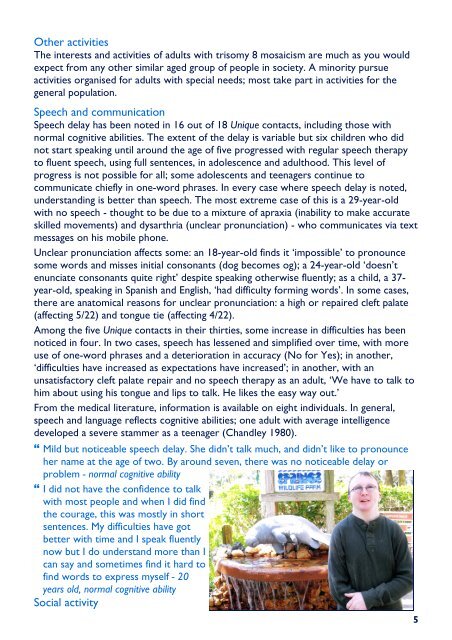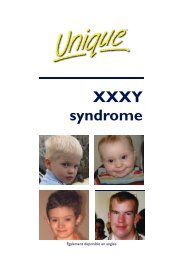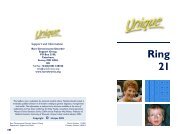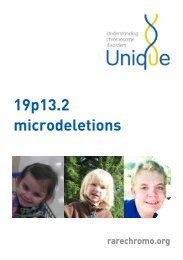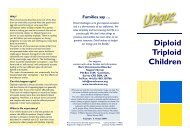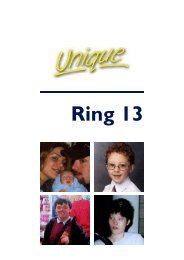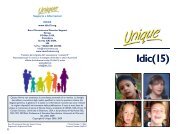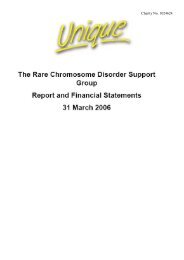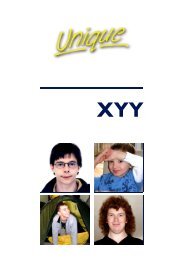Trisomy 8 mosaicism in adults FTNW.pub - Unique - The Rare ...
Trisomy 8 mosaicism in adults FTNW.pub - Unique - The Rare ...
Trisomy 8 mosaicism in adults FTNW.pub - Unique - The Rare ...
You also want an ePaper? Increase the reach of your titles
YUMPU automatically turns print PDFs into web optimized ePapers that Google loves.
Other activities<br />
<strong>The</strong> <strong>in</strong>terests and activities of <strong>adults</strong> with trisomy 8 <strong>mosaicism</strong> are much as you would<br />
expect from any other similar aged group of people <strong>in</strong> society. A m<strong>in</strong>ority pursue<br />
activities organised for <strong>adults</strong> with special needs; most take part <strong>in</strong> activities for the<br />
general population.<br />
Speech and communication<br />
Speech delay has been noted <strong>in</strong> 16 out of 18 <strong>Unique</strong> contacts, <strong>in</strong>clud<strong>in</strong>g those with<br />
normal cognitive abilities. <strong>The</strong> extent of the delay is variable but six children who did<br />
not start speak<strong>in</strong>g until around the age of five progressed with regular speech therapy<br />
to fluent speech, us<strong>in</strong>g full sentences, <strong>in</strong> adolescence and adulthood. This level of<br />
progress is not possible for all; some adolescents and teenagers cont<strong>in</strong>ue to<br />
communicate chiefly <strong>in</strong> one-word phrases. In every case where speech delay is noted,<br />
understand<strong>in</strong>g is better than speech. <strong>The</strong> most extreme case of this is a 29-year-old<br />
with no speech - thought to be due to a mixture of apraxia (<strong>in</strong>ability to make accurate<br />
skilled movements) and dysarthria (unclear pronunciation) - who communicates via text<br />
messages on his mobile phone.<br />
Unclear pronunciation affects some: an 18-year-old f<strong>in</strong>ds it ‘impossible’ to pronounce<br />
some words and misses <strong>in</strong>itial consonants (dog becomes og); a 24-year-old ‘doesn’t<br />
enunciate consonants quite right’ despite speak<strong>in</strong>g otherwise fluently; as a child, a 37-<br />
year-old, speak<strong>in</strong>g <strong>in</strong> Spanish and English, ‘had difficulty form<strong>in</strong>g words’. In some cases,<br />
there are anatomical reasons for unclear pronunciation: a high or repaired cleft palate<br />
(affect<strong>in</strong>g 5/22) and tongue tie (affect<strong>in</strong>g 4/22).<br />
Among the five <strong>Unique</strong> contacts <strong>in</strong> their thirties, some <strong>in</strong>crease <strong>in</strong> difficulties has been<br />
noticed <strong>in</strong> four. In two cases, speech has lessened and simplified over time, with more<br />
use of one-word phrases and a deterioration <strong>in</strong> accuracy (No for Yes); <strong>in</strong> another,<br />
‘difficulties have <strong>in</strong>creased as expectations have <strong>in</strong>creased’; <strong>in</strong> another, with an<br />
unsatisfactory cleft palate repair and no speech therapy as an adult, ‘We have to talk to<br />
him about us<strong>in</strong>g his tongue and lips to talk. He likes the easy way out.’<br />
From the medical literature, <strong>in</strong>formation is available on eight <strong>in</strong>dividuals. In general,<br />
speech and language reflects cognitive abilities; one adult with average <strong>in</strong>telligence<br />
developed a severe stammer as a teenager (Chandley 1980).<br />
Mild but noticeable speech delay. She didn’t talk much, and didn’t like to pronounce<br />
her name at the age of two. By around seven, there was no noticeable delay or<br />
problem - normal cognitive ability<br />
I did not have the confidence to talk<br />
with most people and when I did f<strong>in</strong>d<br />
the courage, this was mostly <strong>in</strong> short<br />
sentences. My difficulties have got<br />
better with time and I speak fluently<br />
now but I do understand more than I<br />
can say and sometimes f<strong>in</strong>d it hard to<br />
f<strong>in</strong>d words to express myself - 20<br />
years old, normal cognitive ability<br />
Social activity<br />
5


